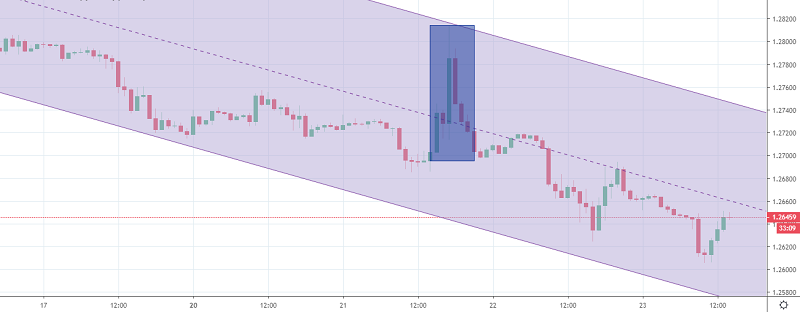
Політичні ризики в Великобританії збільшують шанси здійснення Brexit без угоди
Після того як чергова пропозиція прем’єр-міністра Великобританії Терези Мей щодо Brexit зазнала невдачі, недавні прихильники правління Мей почали відмовлятися від своїх поглядів в бік підтримки чинного уряду Великобританії.
21 травня Т. Мей запропонувала провести черговий референдум щодо угоди з ЄС. Фактично тим самим Т. Мей хотіла обійти більшість в парламенті, яка не підтримує дану угоду.
Вплив на фунт
На тлі такої заяви британський фунт отримав значну підтримку проти більшості конкурентів. Але цей рух в більшій мірі був пов’язаний з корекцією позицій на можливості схвалення даного рішення. І не варто упускати можливість неправильного трактування заяви про новий референдум щодо Brexit.

Мал. Графік GBP/USD з реакцією ринку на новий референдум в Великобританії
Чергова пропозиція Т. Мей провалилася в голосуванні не тільки серед опозиційної партії, а й серед членів її власної. Це викликало нову хвилю розпродажу британського фунта з новою силою.
Крім чергового провалу пропозиції угоди урядом Великобританії в особі прем’єр-міністра Т. Мей, вона опинилася у значній політичній невизначеності після того, як один з її міністрів подав у відставку. Слідом за цим прозвучали вимоги відставки прем’єр-міністра.
Так, глава парламентського «Комітету 1922 року» Грем Бреді заявив, що оголосить вотум недовіри прем’єр-міністру Т. Мей, якщо вона 24 травня не оголосить дату своєї відставки. Тому ще сильніше посилилася політична невизначеність в Великобританії і по ситуації з Brexit.
Ризики Brexit змінюються політичними
Якщо уряд Великобританії виявиться без прем’єр-міністра, до чого все і йде, існує висока ймовірність того, що новим прем’єр-міністром стане людина менш зацікавлена в Brexit. На це вказує зниження числа прихильників виходу Великобританії з ЄС.
До того ж зі змінною прем’єр-міністра різко зросте ймовірність перенесення дати Brexit на більш пізній термін. Це може статися у зв’язку з бюрократичними моментами і регламентом зміни прем’єр-міністра.
Звичайно ж, варто відзначити, що в умовах подібного розвитку подій тієї угоди по Brexit, яку просуває Мей, не буде. Не кажучи вже про те, що сам вихід Великобританії з ЄС може не відбутися, оскільки більшість в уряді Великобританії за краще скасування Brexit більше, ніж вихід без угоди.
Антон Ганзенко